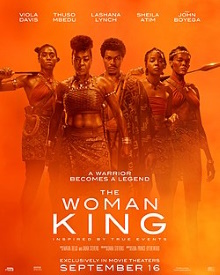Every country has their own historical epics so I’m very pleased to have watched this one about the African kingdom of Dahomey focusing on the all-woman warrior unit known as the Agojie. Colonialist westerners who encountered them called them the Dahomey Amazons but of course the Amazons were mythological while the Agojie were real. This film more or less conforms to the standard tropes of the genre except that more emphasis is laid on the general of the unit rather than the king and of course their all-female nature. I think the film could benefit from being a little shorter and in many ways it’s too bog standard. Still it’s a fine exemplar of its genre and I do love its African focus.
For decades, the kingdom of Dahomey has paid tribute to the larger Ozo Empire but their new king Ghezo is incensed when Oyo soldiers abduct Dahomey villagers to be sold to Europeans as slaves. General Nanisca leads the Agojie warriors to rescue them and the kingdom prepares for war against the Oyo. Meanwhile a young Dahomey woman named Nawi refuses to be married to a rich merchant and her adopted father takes her to the palace to offer her to the king. She joins a new batch of recruits to be trained to become Agolie including women from other tribes they have rescued. As Nanisca argues with Ghezo about ending the slave trade completely and replacing it with the export of palm oil, Portuguese slave traders arrive to deal with the Oyo who are led by General Oba Ade. Nanisca realizes that he was the one who once captured and raped her long ago. One of them Malik turns out to be the son of a Dahomey woman who was a slave. He runs into Nawi in the forest and tries to befriend her.
While the setting is historical in that the Dahomey and the Agojie were real, the characters and specific plot details in this film are all fictional. The individual stories of Nanisca and Nawi are each reasonable but linking them together as long lost mother and daughter strikes me as overly sentimental. It’s still a good balance overall and the emphasis on personal stories instead of Dahomey as a whole allows them to skirt over the historical inaccuracies more smoothly. I do like how they try to capture some of the complexities of the historical situation as the Dahomey themselves also sell slaves to the Europeans and as progressive as their kingdoms seems in some way Ghezo is still a king with a harem of wives. Historically the Agojie were all considered to be married to the king. Speaking as a Malaysian, it’s downright fascinating to have a scene showing industrial scale palm oil production in the 19th century. The relationship between Nawi and Malik too is handled with finesses, not falling into the old-fashioned traps of turning into a silly romance.
The action choreography is surprisingly decent. It is remarkable to see a dramatic actress like Viola Davis convincingly transform herself into an action heroine while still remaining a woman. She is never just a female copy of a standard male action hero as her concerns, emotions and perspectives remain that of a woman. I also liked that they didn’t try to turn Thuso Mbedu as Nawi into a younger version of her. Being smaller and less muscular, she uses lighter weapons and even a rope weapon. The battles are smaller in scale than other historical epics which is probably more accurate. Still I note that the real life Agojie had more diverse types of warrior than depicted here. They had archers and gunners instead of just the skirmishing light infantry shown here.
Historical epics aren’t exactly my favorite genre and this one lacks the scale that makes the best ones truly spectacular. Still it’s a solid entry in the genre and Africans do deserve one of their own that is told from their perspective. The ideal of ending slavery is a worthier moral cause than the nationalism of other epics even if in real life, the Dahomey soon went back to selling slaves after they discovered that selling palm oil wasn’t as lucrative.
